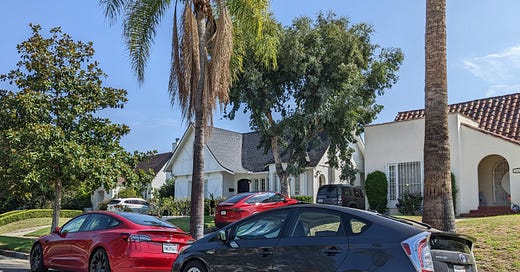Guest Post: You Won't Believe How Many People Have $1,000 Car Payments
Not simple. Hardly straightforward.
Paid subscribers - listen to the audio version of this article - narrated by me - here
I’ve got a treat for you lovely paid subscribers today. My friend
recently wrote a story that BLEW UP over on Medium, and we want to share it with you here today. Rocco also has an excellent Substack called Never Retire - you can check it out here:I’m not surprised this story went viral, it’s a subject that is both universal and often controversial on both sides of the argument - car payments. Specifically, how we have normalized huge payments as “what you do.”
I hope you enjoy Rocco’s story and that it resonates with you. ⬇️
I hesitate to say this for fear of stereotyping Los Angeles.
Because, contrary to popular belief, this is not the norm in LA. It’s just prevalent enough to notice on a daily basis.
In your social circles and on the streets here you’ll frequently run into:
The $50,000-a-year millionaire who drives a fancy car, has a killer apartment (or even owns a home), but barely makes ends meet most months. They’re in debt up to their eyeballs.
The well-to-do households who, even if you didn’t ask, call themselves minimalists. Minimalists who drive Landrovers, Teslas or both and pay more for housing than some of us spend—on everything—in 2, 3, 4, 5, even 6 months.
And, oh, a third one that’s especially infuriating:
The people who judge dates on the basis of how big their apartment is or what kind of car they drive.
To be clear, nine out of ten people you run into in this city are pretty much down to Earth. And, because it’s never wise to generalize, you can certainly mislabel people into one of these three categories when they’re anything but.
It’s just that you talk to and hear about enough people who say such astonishing things about and do such seemingly crazy things with money as it informs and impacts their views on status, life and living to know it’s absolutely a thing.
However, if the response to a recent viral article I wrote on Medium is any indication, it’s absolutely a thing beyond Southern California.
I write a newsletter on Substack called Never Retire. You can check it out here and subscribe to it here. On the surface, Never Retire sounds negative. The newsletter focuses on why it’s not only positive, but a potentially more desirable alternative to traditional retirement.
Of course, Charlie writes about all things Simple and Straightforward here on Substack and at Medium. Quite frequently—like several times a week—our ideas and ideals merge.
Today, we share some of this common ground with you.
The following article—A Pathetic Example Of Living Beyond Your Means That We Have Normalized—originally appeared on Medium.
It answers the question in the title of this guest post.
You really won’t believe how many people took on a $1,000-plus car payment late last year.
It also shows—based on the readership and insightful, personal comments in response—that the subject resonates with those of us who choose to reject spending crazy amounts of money on housing and transportation in favor of saving that cash to spend on things and experiences that actually matter and enhance our quality of life.
So here it is—
Keep reading with a 7-day free trial
Subscribe to This much I know to keep reading this post and get 7 days of free access to the full post archives.








